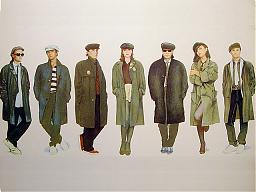- Laboratorija zvuka
Infobox musical artist
Name = Laboratorija zvuka

Img_capt = Laboratorija zvuka promotional photo
Img_size = 250
Landscape =
Background = group_or_band
Alias =
Origin =Novi Sad ,Serbia
Genre = Rock
New Wave
Pop-Rock
Years_active = 1978–1996
Label =PGP RTB Jugoton
Komuna
Associated_acts =
URL =
Past_members = Predrag Vranešević
Mladen Vranešević
Dinna Vranešević
Aleksandar Pejak
Vera Lajko
Dragan Zarić
Đorđe Urban
Vince Olah
Miroslav Ćurćijanski
Ivan Kašik
Renata Viggy
Notable_instruments =Laboratorija zvuka (
Serbian Cyrillic : Лабораторија звука; trans. "Sound laboratory"), sometimes credited as "Laboratorija" only, was an eminent act of the former Yugoslav New Wave scene and theYugoslav Pop and Rock scene in general. The band was formed in 1978 inNovi Sad , Vojvodina, Serbia, then a part of Yugoslavia. They were noted for their eccentric style, erotic lyrics, unusualline up s and bizarrecircus -inspired stage performances.Biography
The main creators of the band were the brothers Predrag "Peđa" and Mladen Vranešević, who comprised a prominent music tandem in former Yugoslavia, especially active in composing music for television and film. The other members in the first line up were: Dinna Vranešević (vocals), Aleksandar Pejak (
guitar ), Vera Lajko (keyboards), Dragan Zarić (drums), Đorđe Urban (bass guitar ), Vince Olah and Miroslav Ćurćijanski (violin s).They achieved their first mainstream success at the
Opatija pop music festival. Their first three singles were released forPGP-RTB , but afterwards, they signed forJugoton to release their debut album "Telo" ("Body") with the following line up: Mladen Vranešević (vocals), Peđa Vranešević (vocals, guitar, keyboards), Đorđe Urban (bass), Ivan Kašik (drums), Dinna Vranešević (vocal), Aleksandar Pejak (guitar) and Renata Viggy (vocals). The album included a tribute song to then-popular Petar Čelik, formerly a skinny boy who later rose to abodybuilding champion. They picked up Petar and his wife to join their stage performances. While the band was playing, Petar was practicing his bodybuilding using various training devices. They also picked up some marginal character from the streets of Novi Sad called Vilmoš Kauboj (Vilmoš theCowboy ). He also toured with them and performed on stage as a "circus" type of an announcer. The complete band on stage consisted of 13 persons.In the end of 1980 they released one of their best known hits, the
ska song "Ska-kavac joj zaš'o u rukavac" which featured quotes from folklore erotic poetry compiled byVuk Karadžić . The other side of the single featured the song "Mod-deran". The title of the song is a play on words: in Serbian, the whole word "moderan" means "modern", but when split into two parts, it stands for: Mod, which is a follower of the Mod subculture, and "deran", which may be translated as brat or "troublemaker". The single cover featured the band dressed inMod Revival fashions and2 Tone styling, which was fashionable during the time of theNew Wave music period. "Ska-kavac joj zaš'o u rukavac" was included on the compilation "Svi marš na ples! " released by Jugoton in 1981.With a slightly changed line up, they released their second album "Duboko u tebi" ("Deeply inside you") for Jugoton in 1982. In this period they were also influenced by the classic
rocknroll sound. Their retro-inspired ballad "Zaboravljena draga" was included in "Vrući dani i vrele noći " compilation released by Jugoton in 1982. In the same year, an older citizen inNovo mesto , Slovenia saw a poster announcing their concert and mistaken Vilmoš Kauboj to beJosip Broz Tito . Thinking that the band is making a ridicule of the president, the man reported them to the police. Peđa was formally sentenced to 40 days in prison, but the whole case was soon dismissed and all charges were dropped.They later played at the Zagreb Bienale festival in
Zagreb , Croatia which that year featured Gang of Four andClassix Nouveaux . There, they established contacts with foreignrecord label s. Afterwards they went to play inGermany where they recorded the new single "Devica 69" ("Virgin 69") and in 1984 they traveled toLondon ,UK for their artistic performances at theInstitute of Contemporary Arts (ICA).In 1986 they release their third album "Nevinost" ("Innocence") for Jugoton. The album featured a bizarre guest appearance of the "
prophet " Dušica Ilić aka "Kleopatra", a person who became popular for "predicting future events". The album included the hit singles "Daj mi bugi, dam ti vugi" ("Give me Boogie, I give you Woogie") and "Igra" ("Game").During the 1980s they composed pop and rock tunes, as well performed for numerous children TV shows including "Poletarac", "Fore i fazoni", "Čik pogodi ko sam", "Priče iz Nepričave" starring
Zoran Radmilović andMilena Dravić and many others.After a long period of inactivity, in 1996 they released their last album with a title "Nema niđe te ljepote" ("There's no such a beauty"). Soon afterwards, they disbanded. Mladen Vranešević died in July 2006.
Discography
ingles
*Dok vam je još vreme/Sve je to bilo u proleće (
PGP RTB 1978)
*Ko ne zna da se smeši/Brek boks (PGP RTB 1978)
*Kad postanem slab i star/Kas (PGP RTB 1979)
*Mod-deran/Ska-kavac joj zaš'o u rukavac (Jugoton 1980)
*Poletarac/Stočiću postavi se/Oproštaj od magneta (Jugoton 1981)
*Devica 69/Šetnja (Jugoton 1982)
*Još ovaj put/Još ovaj put instrumental (Jugoton 1983)tudio Albums
*"Telo" (Jugoton 1980)
*"Duboko u tebi" (Jugoton 1982)
*"Nevinost" (Jugoton 1986)
*"Nema niđe te ljepote" (Komuna Belgrade 1996)Compilations
*"
Svi marš na ples! " (Jugoton 1981)
*"Vrući dani i vrele noći " (Jugoton 1982)References
* [http://www.geopoetika.com/book.php?id=99 Janjatović, Petar. "Ilustrovana Enciklopedija Yu Rocka 1960-1997", publisher: Geopoetika, 1997] sr icon
* [http://www.balkanuk.com/vremeplov.php?id=20 Laboratorija Zvuka Biografija]ee also
*
New Wave in Yugoslavia
*SFR Yugoslav Pop and Rock scene
Wikimedia Foundation. 2010.
